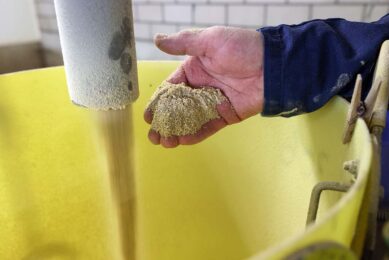Too much DDGS not good for pigmeat
Replacing large amounts of corn with dry distillers’ grains with solubles (DDGS) in swine diets adds excessive unsaturated fatty acids, said Mickey Latour, a Purdue University Extension animal scientist.
Higher than expected levels of unsaturated fatty acids affect the appearance of bacon and sausage, and could affect taste, Latour said. In addition, the balance of Omega-6 to Omega-3 fatty acids in the pork products are likely to be tipped toward unhealthy dietary levels, he said.
“What we’ve found is that replacing 10 to 12% of the corn with DDGS in pig diets is doable,” Latour said. “For gilts it may be more in the range of 6 to 8% because gilts tend to have softer fat relative to barrows.
Wrong fats
“DDGS is a good product for pigs, but you have to be careful how much they are fed,” Latour said. “While beef cattle can consume up to 30%t DDGS without meat degradation, the same is not true of swine.
Research by Latour and fellow Purdue animal scientists Brian Richert and Allan Schinckel finds that the pig’s unique body composition turns DDGS into soft fat at rates higher than when the pig is fed a straight corn-soybean diet.
As the percentage of DDGS fed to a pig goes up, so, too, does the ratio of Omega-6 to Omega-3 fatty acids. Excessive levels of Omega-6 are believed to increase the risk of cardiovascular diseases. Omega-3 fatty acids are known to be healthy fatty acids.
Related website:
• Purdue University
For the latest pig news, subscribe here
Join 18,000+ subscribers
Subscribe to our newsletter to stay updated about all the need-to-know content in the pigsector, three times a week. Beheer
Beheer










 WP Admin
WP Admin  Bewerk bericht
Bewerk bericht